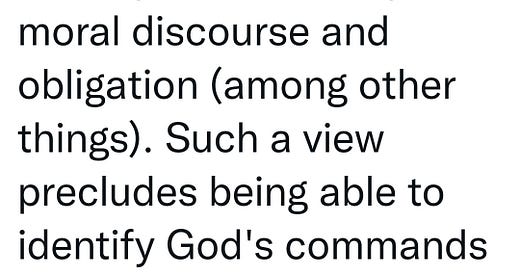Why Skeptical Theism needn't undermine our sense of moral obligations
it's not an ad hoc mysterian appeal
Recently, Atheology Podcast raised an old Skeptical Theism argument:
The article under consideration was this one.
These arguments are too all or nothing and facile.
I offered the following responses.
Good conversation & reasonable arguments. But I'm not persuaded.
Within a double effect moral calculus framework, one subject may have sufficient knowledge of the goods that weigh in the balance in order to justify an unintended (collateral) ontic evil w/proportionate reasons, while another subject would not? This happens all the time in our quotidian existence. How very much more likely this could happen when one of the subjects is God?
It is precisely our justifiable eschatological ignosticism - regarding the weights of the eternal glories - that robs us of any double effect justifications for personally intending or allowing various ontic evils that God might otherwise be justified in permitting. Therefore, regarding the problem of evil, a theist can indeed coherently adopt a logical defense even while steadfastly eschewing ALL evidential theodicies for fear of trivializing the enormity of human pain & immensity of human suffering.
One can reasonably invoke an eschatological ignosticism to the upside, i.e. regarding the weight of eternal glories, and employ reasonings akin to a double effect calculus to maintain that God - even if co-responsible - will not be ultimately culpable for temporal evils.
One cannot reasonably invoke an eschatological ignosticism to the downside, i.e. regarding what would be clearly disproportional eternal punishments for otherwise merely finite subjects (contra universalism).
Since both epistemic & moral fallibilism present in degrees, there's no incoherence in suggesting that we have sufficient, though not perfect, knowledge to reason our way from general precepts to specific concrete norms, most of the time.
Even as we'll ineluctably risk mistakes of the head in so reasoning, those wouldn't necessarily implicate mistakes of the heart.
There's no incoherence in maintaining that our evaluative dispositions, aesthetic sensibilities, moral intuitions, connaturality & natural law apprehensions, especially as formed in community, remain sufficient to fallibly avoid most evil & do great good, while trusting that the ill effects of those evils will be eternally remedied.
What gets God out of the dock needn't be grounded in a case theory (logical defense) nor in a consideration of circumstantial facts (evidential theodicy). What suffices are, rather, character witnesses (hagiographic & Jesus), whose testimony can justify a reasonable doubt independent of all this back & forth. Not that I don't like good defenses!
i commend to all:
Divine-Human Intersubjectivity and the Problem of Evil - Joseph Bracken, Open Theology





